ICI International Conference║Report Shared by UNESCO Feng Chunmiao
2022-11-25
The following is the keynote report by Feng Chunmiao, the chief of Unit for Technology and AI in Education, UNESCO. The content only represents the personal opinion of the speaker.
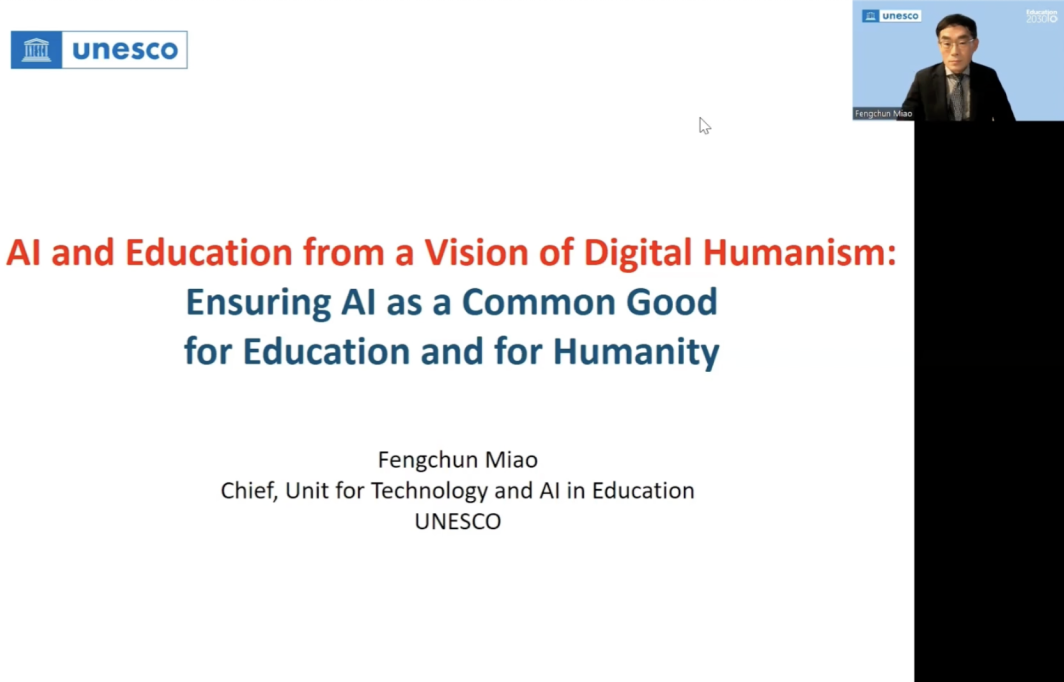
Good morning, distinguished experts, speakers and participants. Thanks to East China Normal University for the invitation. It is a great honor to share some of UNESCO's vision and experience with you. According to UNESCO, AI will not change education unless we ensure that AI serves the public good of education and humanity.
I will share briefly about UNESCO's work on artificial intelligence and education, and I will introduce the recently released report, Artificial Intelligence and Education: A Guide for Education Policymakers. Then, I will also share some reports on the development of artificial intelligence capabilities, especially for school education.
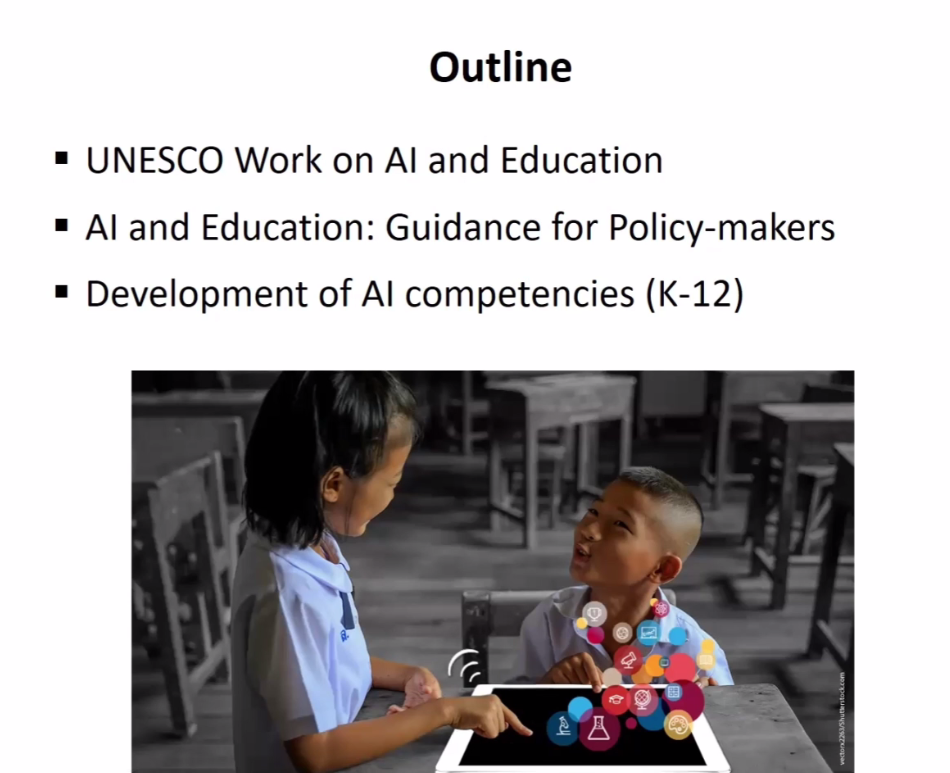
UNESCO has been making a UNESCO closed loop to support countries' educational informatization policies. UNESCO, as an International Center for Standards, has been developing recommendations and instruments in this regard. We are producing guidance compendiums on all important topics in this area.
At the same time, as a catalyst for international cooperation, UNESCO has been organizing international conferences to facilitate knowledge sharing and policy dialogue. In particular, we have held Mobile Learning Week for 9 consecutive years. We are also providing national support, and have supported more than 60 member states to formulate national education informatization policies.
From another perspective, we focus on the most important areas of digital learning, including education informatization policies and overall planning at all levels and in all fields, but also include some emerging areas. For example, more than 20 years ago, UNESCO started promoting the concept of Open Educational Resources (OER). We have also been developing proposals for OER guidelines. We also organized two international conferences on OER. At the same time, since four or five years ago, we have been marching into the field of artificial intelligence and education. We also explore emerging technologies and their impact on education. Based on this, as we said, we have spent more than 15 years, supporting more than 60 countries. Based on this experience, we have developed an educational informatization policy guideline.
Especially on these three most important themes, we have produced the "Guidelines for ICT in Education Policies and Masterplans" and released it this year which will be in the six UN languages. At the same time, after three or four years of hard work, last year, we released "AI and Education: Guidance for Policy Makers". Currently, it is available in 6 UN languages and Korean.
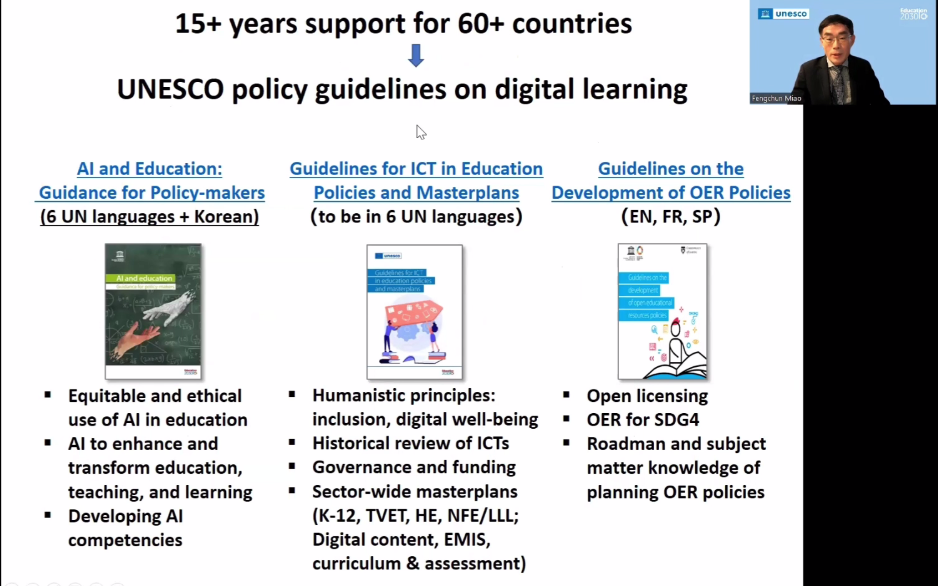
About 3 years ago, based on five or six years of work, we released the "Guidelines on the Development of OER Policies". It is now available in English, French and Spanish. At the same time, we are also seeking, identifying and disseminating best grass-rooted practices in this field. For example, we have also developed and provided ICT in Education Policy Toolkit.
In the toolkit, we have a database of educational informatization policies in more than 100 countries. This is one of the largest databases in the field. I am in charge of the UNESCO Prize for ICT in Education. We have held more than 13 editions of competitions, and each year we select 2 winners.
Now we have 26 winning projects from 21 countries. At the same time, during the COVID-19 pandemic, we launched case studies on the distance learning in response to the COVID-19 disruptions. We published 3 case studies on Finland, South Korea and Saudi Arabia. Four or five years ago, we also carried out the selection of the best global mobile learning practices and released 14 best practices in mobile learning. Regarding AI and education, we have collected more than 80 AI education application cases. We published two casebooks in 2019 and 2020.
At the same time, last year we conducted a survey on the development of artificial intelligence curriculum in 193 countries around the world, especially for K-12. We released the K-12 AI Curriculum Report this year, which is now available in English, Chinese, and Portuguese. At the same time, about 5 years ago, we collected advanced solutions and excellent examples of OER, and there were about 15 case studies.
We published the book OER: Policy, Costs and Transformation. Therefore, based on these excellent cases and guidelines, we are continuing to provide support for countries to formulate education informatization policies.
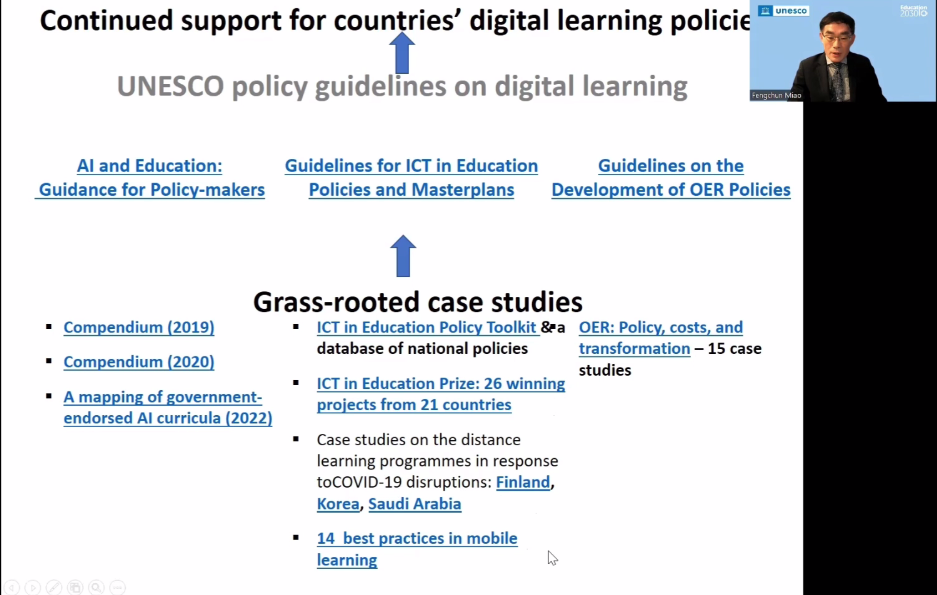
When it comes to UNESCO's work on artificial intelligence and education, we can use the image below to show what we are doing. We are also focusing on different areas. For example, we have a theme that we call developing AI-capable educational policy makers. As we said, we have adopted the Beijing Consensus on AI and Education and issued guidelines for policymakers. Now we are organizing workshops and seminars to support the development of AI and education policy.
This year we organized two regional workshops. The first is for Spanish-speaking countries in Latin America. We organized this workshop for about 10 countries. The second was a workshop on AI and Education Policy for Arabic-speaking countries, about 8 countries. We have already held this seminar for Arabic-speaking countries.
Now we turn to French-speaking countries. We will organize the third AI and Education Policy Symposium. At the same time, we have organized the International Conference on Artificial Intelligence and Education every year since 2019. In 2019, we organized a face-to-face meeting in Beijing, which resulted in the adoption of the Beijing Consensus on Artificial Intelligence and Education. At that time, participants came from more than 120 countries, including more than 50 ministers.
At the same time, we are developing AI ethics in education. We are now conducting a survey in line with the UNESCO Recommendation on Ethical Aspects of Artificial Intelligence adopted in November 2021. We are now researching on educational responses to AI and COVID-19, and AI Ethics in Education. We will develop guidelines on the ethics of educational AI.
At the same time, we're actually developing two AI literacy frameworks. One is AI literacy for students and the other is AI literacy for teachers. We are working with experts, policymakers, youth, and teachers to define AI literacy largely in terms of competition. We will develop an AI literacy guidance framework for teachers and students. At the same time, we are promoting AI as an educational public good, particularly how we can use AI to serve the public good, not only for the advantaged but also for the marginalized, including students with disabilities. At the same time, UNESCO is improving open algorithms and open source tools that serve the public interest in education.
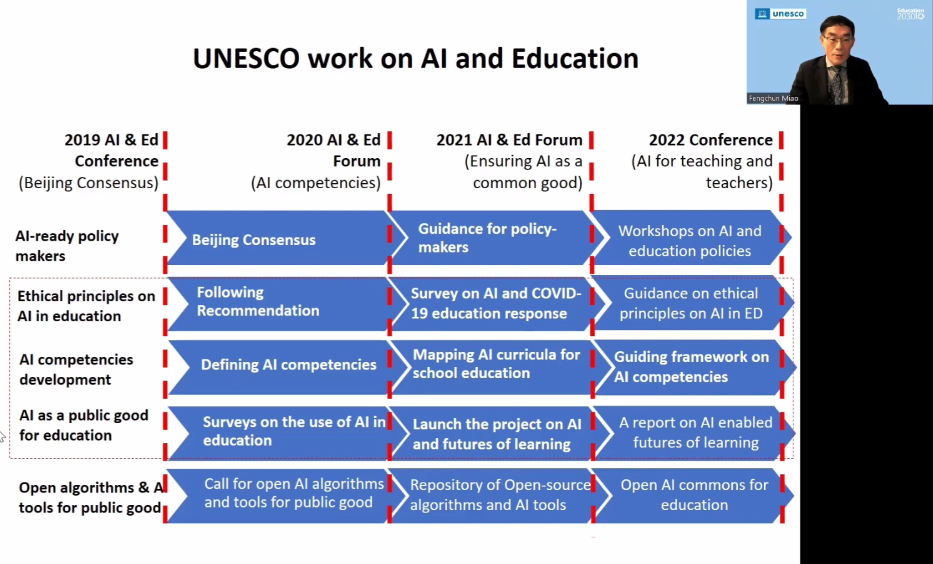
Specifically, in 2021 we published AI and Education: A Guidance for Policymakers. In this guidance, we have attempted to summarize the key must-knows for policymakers about AI, as this is a very new field. Most policy makers, especially in education, lack sufficient understanding of AI and its applications in education, especially how we can use AI to achieve the sustainable development we set in the 2030 Education Agenda Goal 4.
We summarize these necessary knowledge of artificial intelligence, especially starting from human-machine collaboration. We analyze key areas and practical examples of AI and education, particularly the use of AI in education management, education delivery, teaching and teachers, learners and learning, and assessment. We conduct a review of the benefits and risks of these emerging practices.
Specifically, we discuss the challenges of using AI to support SDG 4, including the digital and AI divides, how AI threatens humans, especially teachers and students, when AI is used in teaching, and the paucity of evidence on the effectiveness of teaching AI.
When we prepared this publication, we carried out policy assessments of national AI strategies, particularly with regard to AI and education. We then propose a series of policy planning recommendations on AI and education. But in general, in the end, we advocate that when AI is used in education, we should move towards digital humanism.
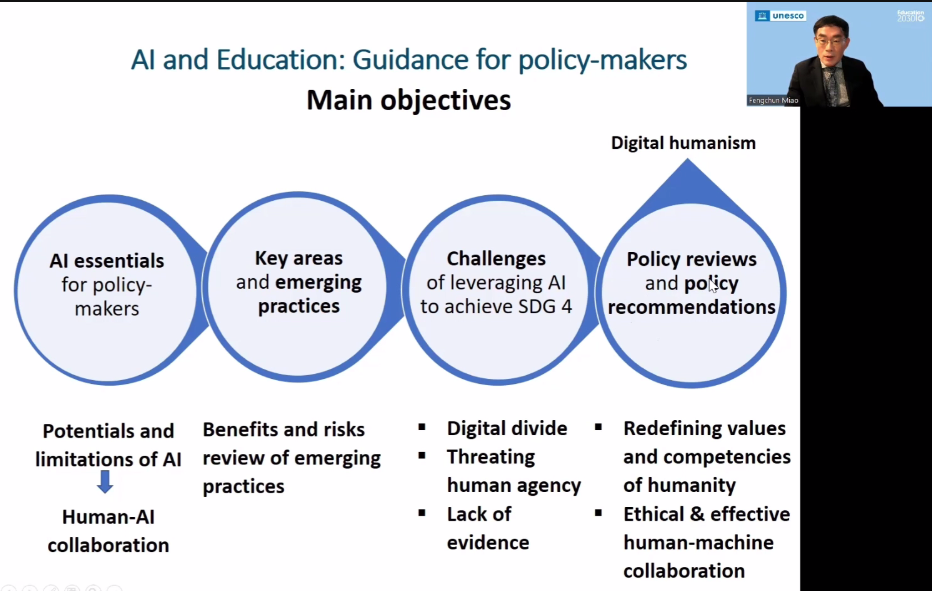
So in terms of digital humanism, it's a rethinking of humanism because UNESCO has been promoting a humanist vision since its inception. Therefore, we need to understand this very important point as we try to understand the origins of humanism and recent developments in digital humanism.
First, there is always a tension between value rationalism and instrumental rationalism, which means that we should consider the value of people first, and then consider people as human resources in the economic sense. For example, other economic organizations, including the OECD, place great emphasis on human resources for economic development. But in the view of UNESCO and the United Nations, we believe that human beings have human value, and when we talk about the application of technology in education, we should emphasize value rationalism.
At the same time, we're going to talk about humanism, specifically what we call a human-centered vision. We should go beyond narrow-minded human-centrism. Especially when we talk about the relationship between human beings and the environment and ecosystems, we cannot always think that human beings are the center and the environment should make sacrifices for human beings. We should think a broader-sense biocentrism. What are the rules for humans in the entire biological ecosystem? How can we actually make sacrifices if we want to protect the environment and ecosystems?
At the same time, UNESCO is developing field-specific international instruments related to humanism. For example, the international instrument "Recommendation on the Ethics of Artificial Intelligence" adopted by UNESCO last year has been adopted by all member states, and it should and must be implemented by all member states.
At the same time, digital humanism can lead us to redefine the core values of education, especially the "four societies" we are very familiar with. On digital humanism, I published an article in Chinese. If you want to know more, you can download this article to get more details about my ideas.
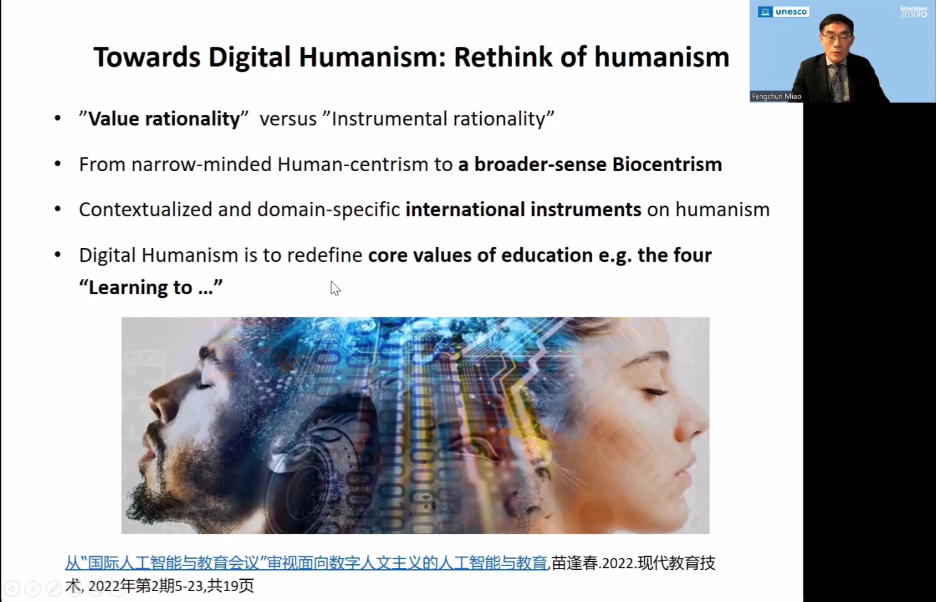
When we try to redefine the "four societies", the United Nations rethinks the meaning of "person", we need to think about what it means to be a person at this time, especially in the digital age. In my opinion, in the digital age, human beings are increasingly becoming a digital-physical amphibious existence.
Humans don't just live entirely in the physical world. We are increasingly living in a hybrid or amphibious environment. More and more young people are spending more time in the digital world than in the physical world. This has very long-term effects.
For all of us, thanks to social media, we are exposed to global news on an almost daily basis and to events happening outside of our country, our native environment. We are increasingly becoming a national presence in a cross-cultural context. At the same time, we also live in any country. We live. We are ruled by the government. So in some sense, we are digital citizens of a sovereign state. Our behavior in the physical world and the digital world need to abide by the law and the rules. At the same time, we also live in a civil society. We are natural beings. We have our biological nature.
If you see "learning to be ", we should think that in the age of digital or artificial intelligence, we have a constant reality, because biologically speaking, we as human beings have not changed in 10,000 years. But if we look at the empirical reality of constant change, the meaning of a man is very different. Our present experience is nothing like the human experience in the agricultural age, or even the beginning of the industrial age. At the same time, the way we perceive and behave is changing due to the world we live in. Therefore, we need to redefine digital humans.
As for "learning to learn", we need to look at what our digital learning means. Historically, even before artificial intelligence entered education, most experts believed that e-learning was the digital transfer of traditional knowledge. Things are very different now. It's more about digital knowledge or the digital acquisition of knowledge. Even now, we are entering a whole new era where machine algorithms are generating knowledge on their own. This is a kind of dehumanized knowledge production. This has huge and profound implications for what it means for our knowledge, knowledge production, and knowledge representation. So when we talk about learning theory, if we don't involve this topic, we can't proof deeply.
"Learning to live together" because we have this digital way of life and use it in socializing. So we need to look at what we mean by human-to-human interaction in the digital age, specifically technology-mediated human-to-human interaction, and what we mean by human-to-technology relationship. And in this digital age, what kind of new social relationships are we living and heading, especially as we move towards the era of artificial intelligence. If the natural world is becoming more mature, if they are becoming more and more influential in our lives, then what will it mean for us to "learn to live together". We need to redefine "living with people" and we need to educate the younger generation to learn to live with people.
"Learning to do", so what to do? For what purpose? How to do it? These are all questions we need to ask in the digital age. We need to think about the skills needed to solve digital problems and how we can help our students and learners acquire the skills they need to do the new jobs created by artificial intelligence and new automation. And, if more and more students, more and more people are starting businesses, what skills should we help them develop?
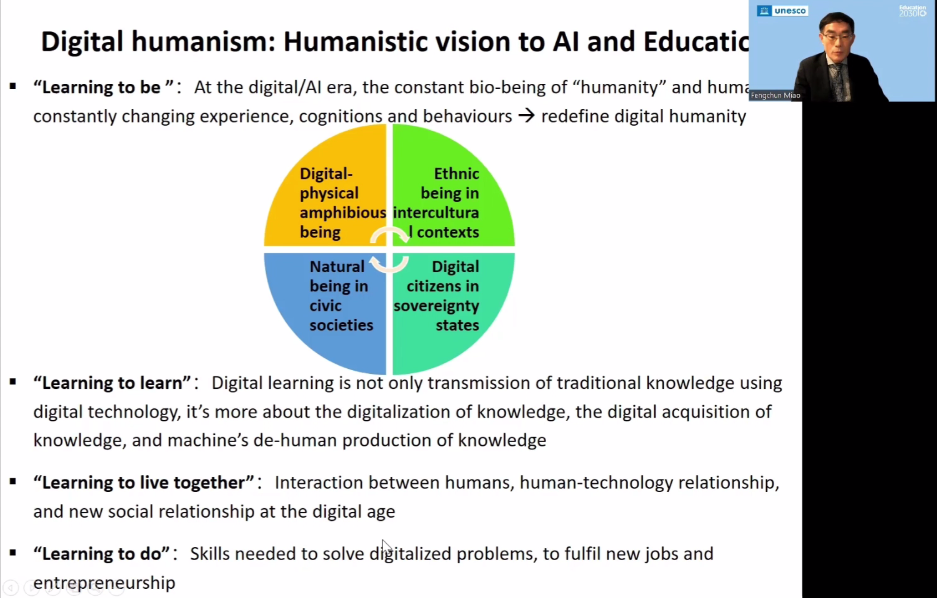
We need to think about new models, and then mobilize digital technology to serve human values and human purposes. Once again, we need to shift from instrumental rationalism to value rationalism to mobilize the resources of the whole society. We need to consider inter-domain co-governance of excessive AI. To do this, we must realize that AI and other technologies will be decentralized. As we see, digital private governance is emerging, and the provision of management, teaching and learning is being decentralized by technology.
But whatever the purposes are, we need to adhere to humanist principles. We also need to find the right balance between policy leverage and governance decentralization. Therefore, I would like to end my speech with this.
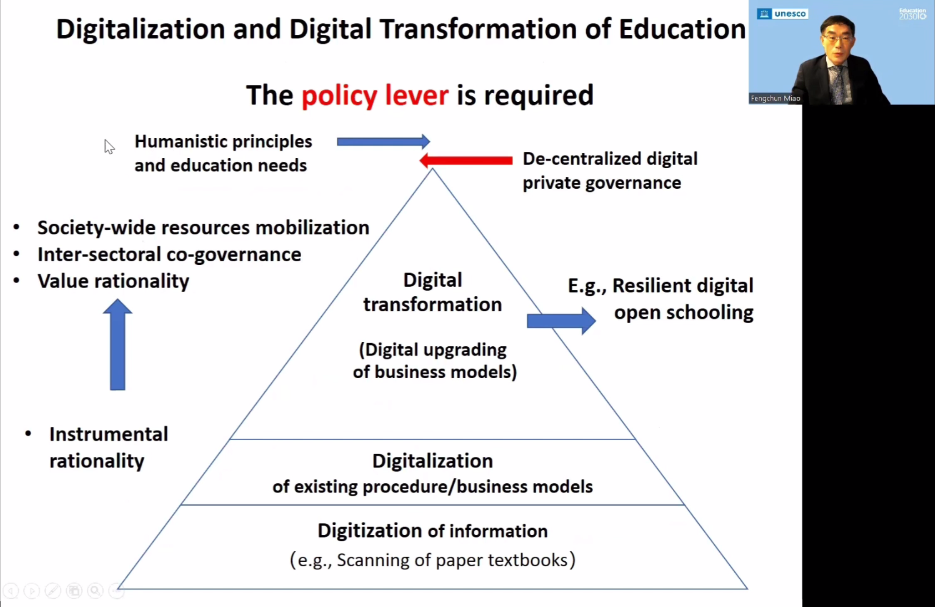
Thank you all!